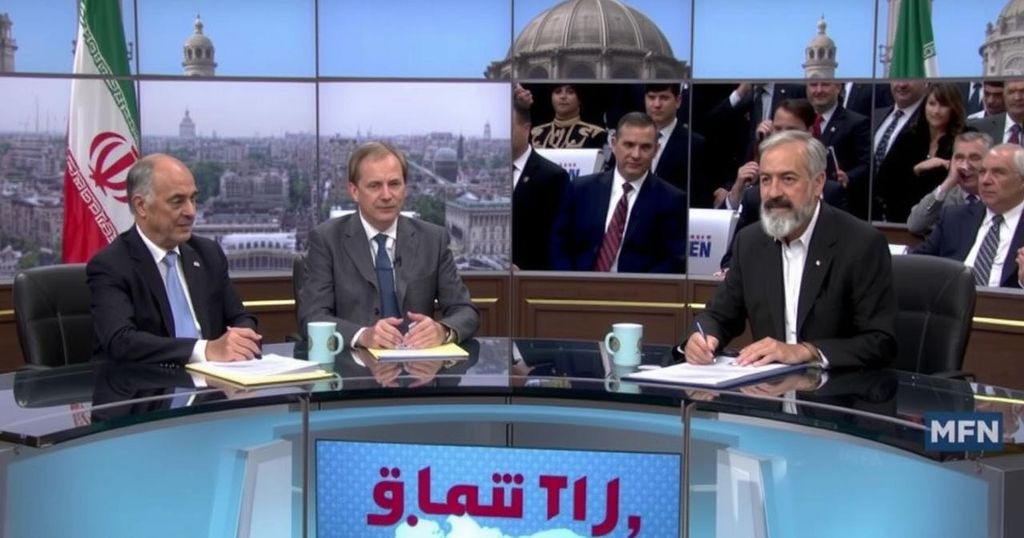The fall of Bashar al-Assad’s rule in Syria has shocked Iranian officials, revealing vulnerabilities within the Syrian army and prompting mixed reactions domestically. Some factions within Iran are calling for continued engagement with pro-Assad forces, while reformists view the situation as a chance to rethink Iran’s foreign policy. As analysts predict a diminishing Iranian influence in Syria, the consequences for Hezbollah and Iran’s nuclear ambitions remain uncertain.
As the regime of Bashar al-Assad faces a sudden collapse in Syria, Iranian officials express astonishment at the rapid advancement of rebel forces, who captured key cities with little resistance. Reports indicate that Tehran was taken by surprise, particularly as Hezbollah fighters had diverted their attention to confront Israel, leaving numerous checkpoints along the border unprotected by the Syrian army. Subsequent Israeli airstrikes further hindered Iranian efforts to support Assad’s regime. As the rebels advanced toward Damascus, Iranian state media shifted its rhetoric, reclassifying the rebels from “terrorists” to “armed groups,” reflecting the changing dynamics on the ground.
In the wake of Assad’s crumbling defenses, leaks emerged suggesting that Tehran had secured assurances from Hay’at Tahrir al-Sham (HTS) regarding the preservation of sacred Shia sites in Syria, aiming to placate religious leaders and the establishment’s supporters. Internal reactions to this turn of events were polarized, with some loyalists criticizing the government for perceived inaction and straying from essential alliances, while reformists perceived a potential benefit for Iran amid the unraveling of the “axis of resistance” against perceived threats from Israel and extremist groups. The complexity of Iranian perspectives was reflected in the comments of anonymous sources who suggested a reconsideration of Iran’s foreign policy framework may soon arise.
Decision-makers within Iran’s establishment appear divided on how to respond. One faction advocates maintaining diplomatic ties with HTS, while another pushes for the establishment of new proxy forces to exert influence in Syria. As the new political landscape unfolds, Iran’s Supreme Leader Ayatollah Ali Khamenei reaffirmed the tenacity of the “Resistance Front,” asserting that external forces fail to recognize the long-term resilience of Iranian influence. Meanwhile, Iranian Foreign Minister Abbas Araghchi noted potential opportunities stemming from regional discontent toward political Islam, hinting at a shift in strategic positioning.
Looking ahead, analysts predict significant geopolitical shifts as Iran’s influence in Syria diminishes. The implications for Hezbollah’s power dynamics in Lebanon may also be exacerbated, potentially leading to a strategic realignment regarding Iran’s nuclear program. Notably, the fragility of Iran’s influence may form the backdrop for future escalations, underscoring the multifaceted ramifications of Assad’s downfall for Iran and the broader region.
The article discusses the unexpected collapse of Bashar al-Assad’s regime in Syria and its implications for Iran’s political and military strategy in the region. Iranian authorities were reportedly caught off guard by the prompt advances of rebel forces, which exposed weaknesses in the Syrian army, especially given the diversion of Hezbollah’s resources toward conflicts with Israel. The situation provoked a mix of responses within the Iranian establishment, shedding light on the complexities of Iran’s foreign policy and its impact on regional stability.
In conclusion, the fall of Assad’s regime presents a pivotal moment for Iran, eliciting mixed responses from its establishment. While some advocate for continued influence through proxies and diplomacy with HTS, others recognize the potential for strategic recalibration in Iran’s foreign policy. The evolving situation poses both challenges and opportunities for Tehran, particularly regarding its long-standing adversaries and the potential repurposing of its nuclear policy in response to heightened existential threats.
Original Source: www.middleeasteye.net






